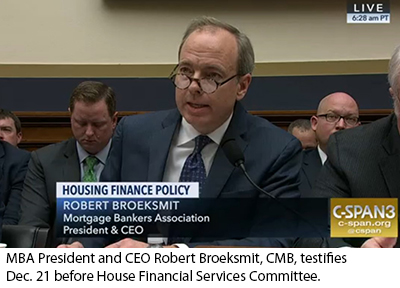
MBA’s Broeksmit, on Hill, Calls on Congress to Enact ‘Comprehensive Structural Reforms’ to Housing Finance System
Mortgage Bankers Association President and CEO Robert D. Broeksmit, CMB, in testimony Friday before the House Financial Services Committee, reiterated MBA’s call for Congress move forward with comprehensive structural reforms to the housing finance industry.
Testifying (http://mba-pc.informz.net/mba-pc/data/images/MBA_Broeksmit_Testimony_12.6.2018.pdf) on legislation that would offer reforms to the government-sponsored enterprises (Fannie Mae and Freddie Mac) and create more opportunities for smaller lenders, Broeksmit said Congress should ensure the real estate finance industry has the tools it needs to serve the current and future housing finance marketplace.
“The housing finance system requires structural reforms that will ensure a stable, liquid secondary market,” Broeksmit said. “Comprehensive legislation is essential for such reforms, and this bipartisan legislation represents a strong step forward in advancing this effort.”
The bill, the Bipartisan Housing Finance Reform Act of 2018 (https://financialservices.house.gov/uploadedfiles/intro_007_xml_bhfra.pdf), has no chance of passage this year. Its chief sponsors, Committee Chairman Jeb Hensarling, R-Texas, and John Delaney, D-Md., are both retiring (the bill’s other chief sponsor is Rep. Jim Himes, D-Conn., who was re-elected); there are no votes scheduled in the Committee to move the bill forward or to the House floor for consideration; and there is no companion bill in the Senate. With the end of the 115th Congress at hand, legislation would need to be reintroduced next year.
 But Broeksmit used the hearing as an opportunity to discuss MBA’s long-held views on housing finance reform and to offer a path for Congress to move forward in the 116th Congress.
But Broeksmit used the hearing as an opportunity to discuss MBA’s long-held views on housing finance reform and to offer a path for Congress to move forward in the 116th Congress.
“The 2008 financial crisis exposed fundamental problems in the GSEs’ business models, as well as weaknesses in the regulatory framework in place at the time,” Broeksmit said. “Ten years later, we have still not determined how or if the GSEs will be reformed. Only by enacting comprehensive legislative reform can we realize the full benefits of a diverse, competitive primary market and a vibrant, liquid secondary market. Reform should proceed without delay.”
Broeksmit noted the bill focuses on several principles including liquidity across mortgage markets, borrower access to credit, lender access to the secondary market, taxpayer protection, consumer choice and a smooth transition to an end state.
“Many of these principles align with what MBA has long supported,” Broeksmit said. “In particular, the draft recognizes that any reforms must meet the needs of the broad array of participants in the housing finance market, including borrowers, lenders, investors and taxpayers. Competition is also woven throughout the discussion draft. MBA believes that robust competition in the secondary market promotes a highly competitive primary market, which in turn provides borrowers with greater choice at affordable prices. Additionally, the draft includes numerous provisions that prohibit discrimination based on lender size or business model, which we agree is of paramount importance.”
Broeksmit expressed support for inclusion of an explicit, federal government guaranty on eligible mortgage-backed securities in the single family and multifamily markets. “In addition, the development of an insurance fund–the Private Capital Reserves–is an appropriate step to ensure the government is compensated for the credit risk that it holds, as well as to create a buffer to absorb losses ahead of taxpayers in the event that a Private Credit Enhancer becomes insolvent,” he said.
Additionally, Broeksmit said the bill’s proposed restriction on vertical integration preventing Ginnie Mae issuers from also operating as Private Credit Enhancers should protect against market distortions that favor larger institutions, though this restriction could be enhanced by expanding it to include a clearer prohibition on any entity simultaneously undertaking both primary and secondary market activities.
“There is an important distinction in the structure of the conventional secondary market, which is served by the Enterprises and operates under a guarantor model, relative to the structure of the government or Ginnie Mae secondary market, which operates under an issuer model,” Broeksmit said. “Though there are merits to both structures, MBA continues to believe that a guarantor model is far more appropriate for the conventional market.”
Broeksmit said one of the greatest challenges to enacting comprehensive reform has been conflicting views on how to best ensure widespread availability of affordable housing, particularly to low- to moderate-income households. He noted affordability in the current housing market is hampered by low inventory and home prices that are rising faster than wages in many areas of the country.
“While this draft does not currently contain specific legislative text, it does include principles regarding the provision of affordable housing,” Broeksmit said. “They focus on targeting and delivering aid to those most in need of assistance. MBA supports the need for strong affordable housing provisions and recommends the authors build out and strengthen this section.
As the GSEs continue into their second decade of government conservatorship, Broeksmit said it is “more critical than ever” that policymakers tackle the remaining work of housing finance reform.
“Access to affordable, sustainable housing is a necessity for all Americans, and as such, it requires a system of financing that is robust in all parts of the country, through all parts of the credit cycle,” Broeksmit said. “Legislative reforms of the Enterprises offer the best path to reach this desired end state.”
The hearing also included testimony from Edward J. DeMarco, President of the Housing Policy Council; Diane Yentel, President and CEO of the National Low Income Housing Coalition; Vince Malta, President-Elect of the National Association of Realtors; Jerry Howard, CEO of the National Association of Home Builders; Don Calcaterra Jr., Vice-President of the Community Home Lender Association; Rick Stafford on behalf of National Association of Federally Insured Credit Unions; Lindsey Johnson, President of U.S. Mortgage Insurers; Alex Pollack, Distinguished Senior Fellow with Financial Markets; and Norbert Michel, Director of the Center for Data Analysis with The Heritage Foundation.
